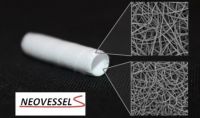UT Horizon Fund invests $150K to fund medical device that repairs blood vessels
AUSTIN—The UT Horizon Fund recently invested $150,000 to fund Cardiovate, a San Antonio-based startup that is using technology from two University of Texas System institutions to commercialize a medical device to treat vascular diseases by repairing blood vessels.
The UT Horizon Fund — a formative-stage venture fund created by the UT Board of Regents that provides capital and support to companies with tangible ties to one of UT System’s 14 academic and health institutions — initially invested $50,000 in seed money for the company in 2013.
“Cardiovate’s disruptive technology will improve outcomes for patients who suffer from vascular diseases such as peripheral artery disease,” said Julie Goonewardene, UT System associate vice chancellor for innovation and strategic investment and managing director of the UT Horizon Fund. “The UT Horizon Fund continues to support the company’s efforts to move its life-saving medical device from the laboratory to the bedside.”
Cardiovate CEO Mark Standeford said having the UT Horizon Fund as an investment partner brings credibility and will help attract other investors to his company.
“Start-up capital is crucial for any company and especially those in the life science area,” he said. “The investment from the UT Horizon Fund represents a strong commitment to a technology that originated from UT San Antonio and UT Health Science Center San Antonio. The fund not only brings the financial support to accomplish early-stage milestones but it’s also a great partner to help us acquire additional financial support in the future.”
Cardiovate’s medical device was developed by Jordan Kaufmann, Ph.D., while she was a graduate student at UTSA’s College of Engineering, along with her faculty advisers Mauli Agrawal, UTSA vice president of research; and Steven Bailey, M.D., division chief for cardiology at UT Health Science Center San Antonio’s School of Medicine.
“Vascular disease is a progressive and life-threatening condition,” Standeford said. “Our technology will help those patients suffering from it who rely on synthetic bypass grafts for treatment. Current synthetic grafts often times fail to perform well in long-term applications, requiring patients to undergo additional surgeries to treat the condition, or in some cases, they must undergo an amputation.”
Cardiovate’s graft — made from a biodegradable material that can be absorbed by the body after use — is designed to support the body’s own healing process to develop new vascular tissues over time. The three-dimensional architecture and distinct surfaces of the graft will enable the growth of a patient’s own cells. The graft will be used for surgical repairs of blood vessels for peripheral artery disease and below-the-knee surgical applications.
Standeford said the UT Horizon Fund’s latest investment will help Cardiovate execute the next phase of research to conduct long-term studies and show improved results from its grafts compared to other current devices.
About The University of Texas System
Educating students, providing care for patients, conducting groundbreaking basic, applied and clinical research, and serving the needs of Texans and the nation for more than 130 years, The University of Texas System is one of the largest public university systems in the United States. With 14 institutions and an enrollment of more than 221,000, the UT System confers more than one-third of the state’s undergraduate degrees, educates almost two-thirds of the state’s health care professionals annually and accounts for almost 70 percent of all research funds awarded to public institutions in Texas. The UT System has an annual operating budget of $17.9 billion (FY 2017) including $3 billion in sponsored programs funded by federal, state, local and private sources. With more than 20,000 faculty – including Nobel laureates – and nearly 80,000 health care professionals, researchers, student advisors and support staff, the UT System is one of the largest employers in the state.
News Contact Information
Jenny LaCoste-Caputo: jcaputo@utsystem.edu • 512-499-4361(direct) • 512-574-5777 (cell)
Karen Adler: kadler@utsystem.edu • 512-499-4360 (direct) • 210-912-8055 (cell)



